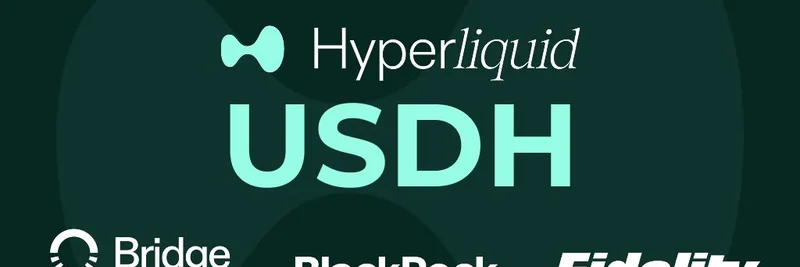Hey there, crypto enthusiasts! If you're deep into DeFi or just love keeping tabs on the latest blockchain buzz, you've probably heard about Hyperliquid's push for its own native stablecoin, USDH. Recently, The Rollup TV dropped a special episode diving into this hot topic, sparked by a tweet from @therollupco. Let's break it down in simple terms – no jargon overload here – and see why this could shake up trading, especially for those wild meme tokens.
Why Hyperliquid Needs USDH: The Big Picture
Hyperliquid is a powerhouse perpetual futures DEX built on its own lightning-fast chain. Right now, it relies heavily on bridged USDC for liquidity, with about $5.5 billion locked in. That's great for stability, but here's the catch: all that sweet yield from US Treasury bills (around $220 million a year) flows straight to Circle and Coinbase, not back to Hyperliquid's community or its governance token, HYPE.
Enter USDH – Hyperliquid's bid to create a homegrown stablecoin that keeps the value in-house. By issuing USDH natively, Hyperliquid can redirect those yields to buy back HYPE tokens, boosting holder value and reducing dependency on external stables. It's like turning a leaky faucet into a revenue stream. The community gets to vote on the best proposal via validators after the next network upgrade, making this a truly decentralized decision.
The Rollup TV Special: What Went Down
The tweet announced a live broadcast on X (formerly Twitter) Spaces, titled "The Rollup TV: Hyperliquid USDH Stablecoin Special." Hosted by Andy and Robbie from The Rollup, it featured face-to-face chats with key players in the digital assets space. While the live session wrapped up, you can catch highlights or related discussions on their YouTube channel. The focus? Breaking down the proposals vying to build and manage USDH, and how this could supercharge Hyperliquid's ecosystem.
From the chatter in replies and related posts, folks are hyped. One standout was Frax Finance's update, pushing a bank-backed alliance for USDH issuance. It's all about compliance, native integration, and funneling 100% of yields back to Hyperliquid.
Top Proposals in the Bidding War
Several heavy hitters have thrown their hats in the ring, each promising top-tier compliance, scalability, and massive yield returns to HYPE holders. Here's a quick rundown:
Frax Finance: Leading with a U.S. bank partnership for native issuance. They're HyperCore-ready, aligned with U.S. GENIUS regulations, and commit 100% of yields to Hyperliquid. Frax is DeFi-native, so expect efficient on-chain mechanics.
Paxos: Proposing a fully regulated USDH under U.S. and EU rules (like MiCA). They pledge 95% of interest earnings for HYPE buybacks, with institutional bridging and buyback incentives for the community.
Agora (AUSD): Focused on collaborative infrastructure, offering scalable solutions and high yield passthroughs (up to 95%+). They're all about ecosystem alignment and have ties to broader stablecoin networks.
Native Markets (with Bridge/Stripe): A dedicated team building USDH tailor-made for Hyperliquid. Backed by Stripe's payments infra, they handle reserves (90%+ at BlackRock/Superstate) while promising full control and roadmap ownership to the community.
Circle: Late to the party but signaling interest in native USDC deployment. However, with USDH's focus on capturing yields internally, this might not cut it.
To make it easier, check out this comparison table:
| Proposal | Key Features | Yield Allocation to Hyperliquid | Regulatory Alignment |
|---|---|---|---|
| Frax | Bank-issued, HyperCore-ready | 100% | GENIUS, U.S. federal |
| Paxos | Institutional bridging, compliant | 95%+ for HYPE buybacks | U.S. GENIUS, EU MiCA |
| Agora | Scalable infra, collaborative | 95%+ | Broad compliance |
| Native Markets | Custom-built, Stripe-backed reserves | Full passthrough | Payments-scale |
| Circle | Native USDC alternative | TBD (likely lower) | Existing USDC regs |
These bids are essentially a race to offer the most "Hyperliquid-aligned" terms, with most revenues flowing back via HYPE buybacks. It's a win for users, as it could generate hundreds of millions in annual value.
How This Ties into Meme Tokens and Trading
Now, why should meme token fans care? Hyperliquid's perp DEX is a go-to for trading volatile assets like memes – think endless leverage on the next big pump. With USDH, liquidity gets deeper and cheaper, minus the bridging risks. Meme launches could pair directly with USDH, sparking more on-chain activity and potentially turning Hyperliquid into a meme haven rivaling Solana's Pump.fun.
Plus, HYPE's price has already mooned past $50 amid the hype (pun intended), with a $13.9 billion market cap. If USDH captures even half of USDC's volume, we're talking serious gains for holders. For blockchain practitioners, this is a masterclass in ecosystem bootstrapping – building self-sustaining value loops that empower communities over centralized issuers.
Wrapping Up: A Stable Future Ahead?
The Rollup TV special shines a spotlight on a pivotal moment for Hyperliquid. As proposals roll in and validators gear up to vote, USDH could redefine how DeFi platforms handle stables. Whether you're trading memes, farming yields, or just watching from the sidelines, keep an eye on this – it's not just about a new coin; it's about owning your ecosystem's money.
Got thoughts on which proposal wins? Drop them in the comments or check out the original tweet for more community vibes. Stay tuned for updates as this unfolds! 🚀

